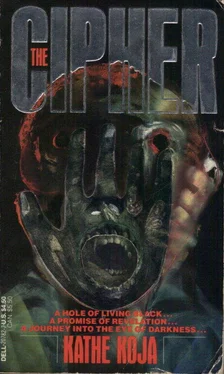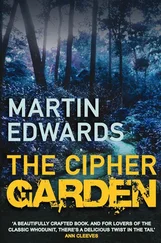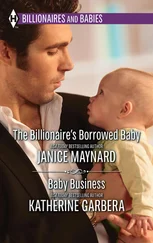“Come here, Malcolm,” I said.
He didn’t want to, of course. But he did. He was stupid, Malcolm, stupid like me but in a different way, more selfish, meaner. He would never have tried to stop Nakota, never understood that for her there would be no transformations, no ultimate transcursion to fulfillment: she was just another insect, just another fucking bug, there were no signs and wonders to be given to her. I knew those things. I loved her.
“Here,” I said. “I want to show you something.”
The mask smiled, showing teeth so crooked and bloody that even he should have been warned. But he didn’t look up, he didn’t see, instead stopped, stooping, to stare at Nakota, at me, the pestilential gallop of the fluid across my body. He stood awhile, looking, then, “You killed her,” he told me, as if I didn’t realize that.
“Yeah, I killed her…. I said come here,” and I grabbed him, he never expected me to be so fast, I grabbed his ankle and pulled him flat as a tablecloth, flat like a magic trick and dragged him, one slewing swoop, to the lip of the Funhole and I said, “Take a good look,” and shoved his head in, held it down like drowning, but I knew he wasn’t drowning. I knew he wasn’t going to die.
Finally I let him up.
Noises, coming from him, dry and gagging. Flailing his arms, reaching up to touch his face. His face—well, part of it was still normal, the eyes, but no transcursion for Malcolm. No nose either. He had a new mouth, though, something like a viperfish. You know what a viperfish looks like? Lots of teeth.
“You got your wish,” I said. “Now get the fuck out of here.”
He tried to say something back but it was going to take a long, long time for him to learn to talk with a mouth like that. I think he was crying. I didn’t see when he left.
Later, lots of noises in the hall. The door had shut itself, world’s fastest scar tissue, but I could still hear them, screams, arguing. Apparently Malcolm’s appearance had caused quite a stir. Some guy kept insisting on the police. “They can break down the door,” he said, over and over. “They can just break down the fucking door.”
So can you, I thought, but I didn’t say it. I was done talking to people.
Maybe the police are coming, or the manager, or whoever owns this building. I don’t know for sure, I think they are, but then again I haven’t exactly been paying attention. I’ve been busy.
After I got Nakota arranged the way I wanted her, safe there in the corner with hands at her sides, I just stopped thinking about anything. Or worrying. Things for me are very simple now, reduced to two ideas, or maybe the double sides of one.
I can never come out.
So I guess I’m going in.
Not right away, though. This fluid is moving so fast, now, my own personal tidal wave and I want to wait until I’m covered, till I’m coated like a bloody blade of glass, before I go. I’m not absolutely sure, of course I have my theories even if I’m not Malcolm, but I don’t think it can hurt, anyway. And if somebody, police or whatever, gets here before then, so what. By the time they figure out how to handle me, the icky-sticky man, I’ll be gone.
Don’t wish me luck. All I want is a smooth ride.
There’s still one thing I don’t know, though, and with Nakota gone there’s no one left to help me speculate: all along she called me the catalyst, said it wouldn’t work without me; she said I was the key. But what happens when you put that key in the door? Does it lock, safe and snug? Does it close like water, rushing absolute and smooth to heal the gap, sealing over as if the empty spot had never been? What pretensions I have are something less than grand; I’m not much and I know it, so there’s no question of hubris-when I say that I’m what it wants, even what it, maybe, came for—the why, of course, is beyond me, always will be and I don’t care. All that’s left for me to do is put the key in the lock, and close this door for good.
Although Nakota, if she were here enough to talk, might propose something different, might suggest that the same key that locks a door can open it, finally and wide.
But worst of all, the darkest part of me suspects a truth so black it turns my nebulous fears of a Funhole somehow empowered and unleashed by my addition to the laughable specter of an underbed bogeyman: what if it is me? What if somehow I’m crawling blind and headfirst into my own sick heart, the void made manifest and disguised as hellhole, to roil in the aching stink of my own emptiness forever? Oh Jesus. Oh God that can’t be true.
Because then I’d never stop thinking, don’t want to hurt anyone, but I’d rather it be king but that.
Love is a hole in the heart.
—Ben Hecht

KATHE KOJA has, at various times, been a bonsai lumberjack, an oyster cowboy, and a freelance criminologist. She lives on the outskirts of Detroit, aka Motor or Murder City, with artist Rick Lieder and her son. Her stories have appeared in Isaac Asimov’s Science Fiction Magazine and The Magazine of Fantasy and Science Fiction. Her highly acclaimed short story, “Distances!” appeared in Gardner Dozois’s Year’s Best Science Fiction #6 and Orbit.













